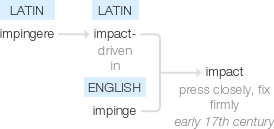Impact
early 17th century (as a verb in the sense ‘press closely, fix firmly’): from Latin impact- ‘driven in’, from the verb impingere (see impinge).
wiktionary
Attested since the 17th century, from Latin impāctus, perfect passive participle of impingō(“dash against, impinge”), from in- + pangō(“fasten, drive in”), ultimately from Proto-Indo-European *peh₂ǵ-.
etymonline
impact (v.)
c. 1600, "press closely into something," from Latin impactus, past participle of impingere "to push into, drive into, strike against," from assimilated form of in- "into, in, on, upon" (from PIE root *en "in") + pangere "to fix, fasten" (from PIE root *pag- "to fasten"). Original sense is preserved in impacted teeth. Sense of "strike forcefully against something" first recorded 1916. Figurative sense of "have a forceful effect on" is from 1935. Related: Impacting.
impact (n.)
1738, "collision, act of striking against, striking of one thing against another," from impact (v.). Figurative sense of "forceful impression" is from 1817 (Coleridge).
